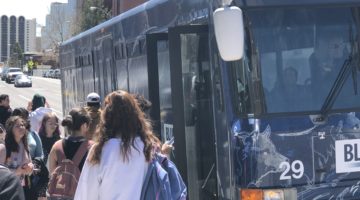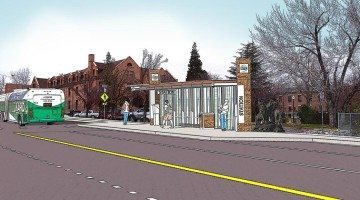
A student climbs aboard a PackTRANSIT bus on Feb. 12, 2018. PACKTransit transitioned to a single service line that operates one continuous loop around campus, beginning Aug. 2019.
University of Nevada, Reno, students can expect several changes to transportation options around campus.
As of the beginning of the 2019 fall semester, PACKTransit transitioned to a basic service which operates one continuous loop around the campus. The service line, called PACKLine, serves eleven stops from 8 a.m. to 4 p.m., Monday through Friday.
Last semester, the silver and blue lines each ran from 7:00 a.m. to 10:00 p.m.
Michelle Horton, Director of Facilities Services and Parking and Transportation Services, said the new transportation service is meant to be more cost-effective for the university.
“Three years ago, we identified that the shuttle operation was not sustainable with the current funding model and the ‘basic service’ was formed,” Horton told The Nevada Sagebrush in an email. “This ‘basic service’ included a continuous one-loop service from 8 a.m. to 4:30 p.m., Monday through Friday. Understanding that this was not ideal for some students, we went to both ASUN and GSA to gain support of an annual student fee (somewhere from $6 to $8) to fund the extra service. In the end, while the student leadership groups appreciated the PACKTransit service, they chose not to move forward with a student fee with the understanding that the service would transition to the basic service in the fall 2019.”
The cost savings resulting from the new transportation system has allowed the Parking and Transportation Services to operate within its budget, including providing necessary funding for deferred asphalt projects that have been delayed due to a lack of funding.
“The single one-loop system allows two buses to service the campus instead of three buses and the reduction of hours in the morning and evening has saved the department over $300,000,” Horton said.
According to Horton, no complaints have been brought to the attention of the Parking and Transportation Services Department.
Despite no complaints being brought up to the department, students and former university employees have expressed their concerns to The Nevada Sagebrush.
Rachael Reyes, a junior at the university, said she is unhappy with the change in transit that has taken place.
“The university’s decision to make one line instead of two is one of the most illogical decisions that the university has yet to make,” said Reyes. “Last year, when there were separate line for the east and west sides of campus it took only about twelve to fifteen minutes for the bus to make its rounds. Now it takes about 20 to 25 minutes. It also only runs from 8 a.m. to 4:30 p.m. which doesn’t benefit my roommates or I at all considering a lot of people have class before 8 a.m. and most of my classes end at 5:45 to 6:45 at night. I just don’t understand why they would change a perfectly fine system.”
When the university made the transition to single-line transportation system, bus drivers were laid off. According to Meike Verebely, one of the bus drivers laid off due to the new transit route, three drivers, including her, were let go from a staff of eight.
Verebely said she feels bad for the students and is concerned for their safety.
“It really hurt,” said Verebely. “The new system doesn’t do anyone any good. The change is all about profit and it compromises the safety of the students. The kids have to wait for thirty minutes or more, and they can’t all rely on campus escort. Around the medical building and The Republic Apartments there’s very little light and it worries me. For the students that are forced to walk home from night classes, it’s a safety concern.”
Verebely worked as a university bus driver from 2014 up until the point she was laid off in 2019. She currently works for Keolis which took over the operation of RTC Ride service in July 2019.
“When we found out about the change to PACKLine, the students didn’t even know. People relied on the buses, it’s just not right. I needed my job,” said Verebely.
In addition to the PACKLine, Campus Escort runs a shuttle that continuously stops at various high-traffic locations, including major residences and central locations, around campus. Campus Escort, however, only runs nightly from 5:00-10:00 p.m., Monday through Thursday.
Campus Escort has to run a longer shuttle and now has a significantly more demand for their service since the change.
Campus Escort student worker Adrian Hastings said due to the cuts, he now works a longer route.
“We have to run a longer shuttle and have more demand. Instead of having kids rely on PACKTransit we have to begin at 5:00 so kids have a way to get home,” Hastings said.
“This new system has affected a lot of the way a lot of the ways things are run on campus,” Reyes said. “While the bus stops running at 4:30, campus escort begins at five and runs as the bus does. However, the problem with that is campus escort is maybe a nine to ten seater van. There are hundreds of people that rely on the bus to get home so it takes around fifty minutes for campus escort to make its rounds from five to six in the evening, which is when a majority of students get out of class, causing them to just walk home anyways.”
Kennady Pine can be reached at kpine@sagebrush.unr.edu, or on Twitter @NevadaSagebrush











